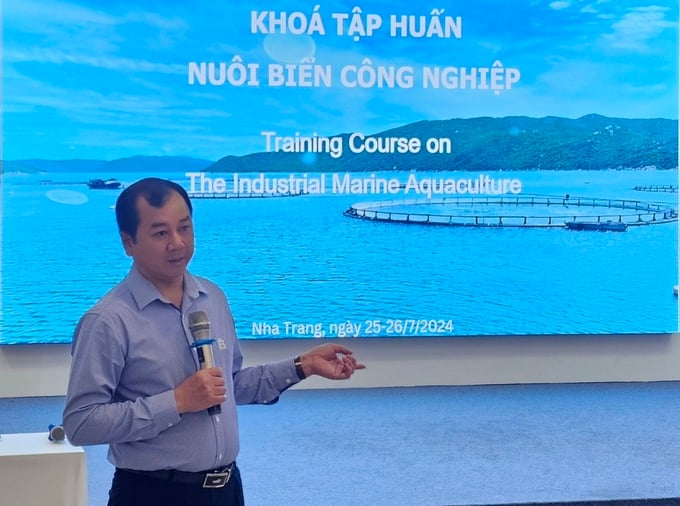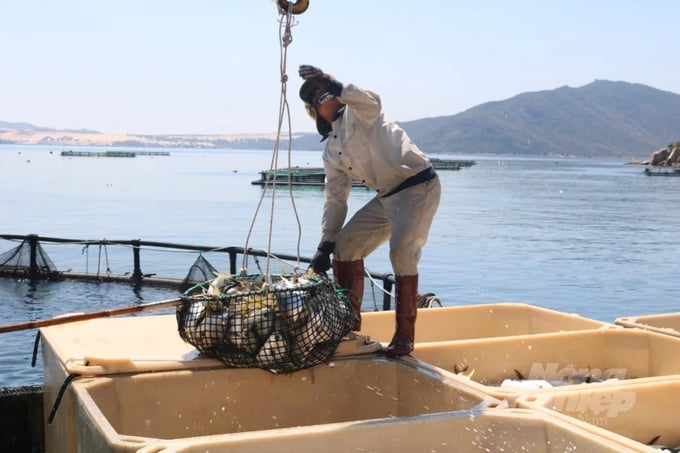November 27, 2025 | 01:11 GMT +7
November 27, 2025 | 01:11 GMT +7
Hotline: 0913.378.918
November 27, 2025 | 01:11 GMT +7
Hotline: 0913.378.918

Tran Dinh Luan, General Director of the Directorate of Fisheries, giving a presentation at the general knowledge training session on industrial mariculture. Photo: KS.
The Directorate of Fisheries, in collaboration with the Vietnam Chamber of Commerce and Industry - Ho Chi Minh city branch (VCCI-HCM), organized a general knowledge training session on industrial mariculture for 20 trainees, who currently work as officers at fisheries sub-departments in the northern and central coastal provinces. The event was held on July 25, in Nha Trang city, Khanh Hoa province.
According to Bui Thi Ninh, Director of the Bureau for Employer’s Activities in Vietnam (VCCI-HCM), the agency has coordinated closely with experts within the industrial mariculture sector and cooperated with the Vietnam Seaculture Association over the last five years to develop various training programs and provide technical support to local workers and businesses. These programs featured knowledge from Norway, the world's leading country in industrial mariculture.
Director Ninh further reported that VCCI's cooperation programs have resulted in methodical, high-quality knowledge and training materials. The materials also received praise from the Directorate of Fisheries for their comprehensive content.
Subsequently, the Directorate of Fisheries, in collaboration with VCCI-HCM, organized a training program to provide officers at local fisheries sub-departments with knowledge on industrial mariculture. The program also featured the various projects that the Directorate has implemented in multiple provinces, including Khanh Hoa, Ninh Thuan, and Kien Giang, over the course of the last five years.
"This is our opportunity to share the information and knowledge that we have built over the years, with the aim of enhancing capacity and sharing experiences with officers working at local fisheries sub-departments," Director Ninh remarked.

An industrial-scale mariculture model in Khanh Hoa province. Photo: KS.
Tran Dinh Luan, General Director of the Directorate of Fisheries, commented that this program is the first training course aimed at familiarizing local officers with the context of marine economic development and industrial mariculture, as well as providing updates on global trends in technology and management of industrial mariculture facilities. The program also aims to define the scope and application levels of competency standards and training programs, materials for industrial mariculture.
Consequently, General Director Luan expects the trainees to engage in comprehensive discussions with experts. "We do not have the opportunity to visit Norway or consult with countries that possess a developed industrial mariculture sector. As a result, these training materials and programs will provide officers at local fisheries sub-departments with the opportunity to acquire knowledge regarding industrial mariculture, which will help them effectively perform their professional duties, and guide the local community and businesses," General Director Luan emphasized.
General Director Luan also suggested trainees share their newly acquired knowledge with colleagues through brief thematic sessions following the training program, thereby promoting knowledge of industrial mariculture. "We should learn from developed countries and the meticulousness of the Japanese to develop successful industrial mariculture, with a focus on avoiding unnecessary risks and mistakes," General Director Luan added.
According to the schedule, the training program will conclude on July 26. After theoretical lectures, the trainees will conduct a field trip to the industrial-scale mariculture facility belonging to Australis Vietnam Fisheries Co., Ltd. in Van Phong Bay, Van Ninh district, Khanh Hoa province.
According to General Director Tran Dinh Luan, the Minister of Agriculture and Rural Development emphasized the importance of training and certification for all agricultural professions, including mariculture. Consequently, individuals engaged in mariculture must possess the necessary knowledge and skills instead of relying solely on experience.
Khanh Hoa province launched an initiative for high-tech open water mariculture in May 2023. The initiative aims to demonstrate the contents of the Politburo’s Resolution No. 09 and the Government’s Resolution No. 42; namely, the construction and development of Khanh Hoa province until 2030, with a vision towards 2045. These Resolutions emphasize a "strong development of the maritime economy, with a focus on aquaculture, harvesting, seafood processing, particularly high-tech mariculture, and environmentally friendly practices."
With the sponsorship of Thien Tam Fund, Khanh Hoa province’s Department of Agriculture and Rural Development collaborated with the Research Institute for Aquaculture III (Ministry of Agriculture and Rural Development) to develop a pilot project for high-tech mariculture in Khanh Hoa province.
After receiving approval from the Prime Minister and the Provincial People's Committee, Khanh Hoa province’s Department of Agriculture and Rural Development instructed the local Agricultural Extension Center to collaborate with Thien Tam Fund and suppliers to install mariculture cages, surveillance cameras, and positioning devices for farmers before releasing shrimp and fish fry into the supported cages.
Translated by Nguyen Hai Long
/2025/11/26/4909-2-154329_878.jpg)
(VAN) Pearl grouper farming in HDPE cages not only delivers economic efficiency but also contributes to protecting the environment, creating jobs, and promoting marine-based experiential tourism.

(VAN) The model of making a living under the forest canopy through the agroforestry system in Van Son commune, Bac Ninh province, is expected to generate an annual income of approximately VND 30 million/ha.

(VAN) Many enterprises in Can Tho are harnessing natural energy and reducing greenhouse gas emissions in their production processes, thereby contributing to the promotion of a sustainable green transition.
/2025/11/24/3536-2-112800_176.jpg)
(VAN) Dong Nai now has tens of thousands of hectares of forests certified for sustainable management, and this area will continue to be expanded in the coming period.

(VAN) Vinh Ha hamlet (Dai Xuyen commune, Hanoi) is shifting away from small-scale farming as households adopt bioscurity into their breeder chicken models.

(VAN) Heavy rains make aquatic species more vulnerable to disease. Proactive water management and high-tech systems help farmers prevent outbreaks and protect yields.

(VAN) Greenhouses are shifting production mindsets in Binh Lu commune, enabling farmers to ‘weather the sun and rain’ and secure stable vegetable harvests throughout the year.